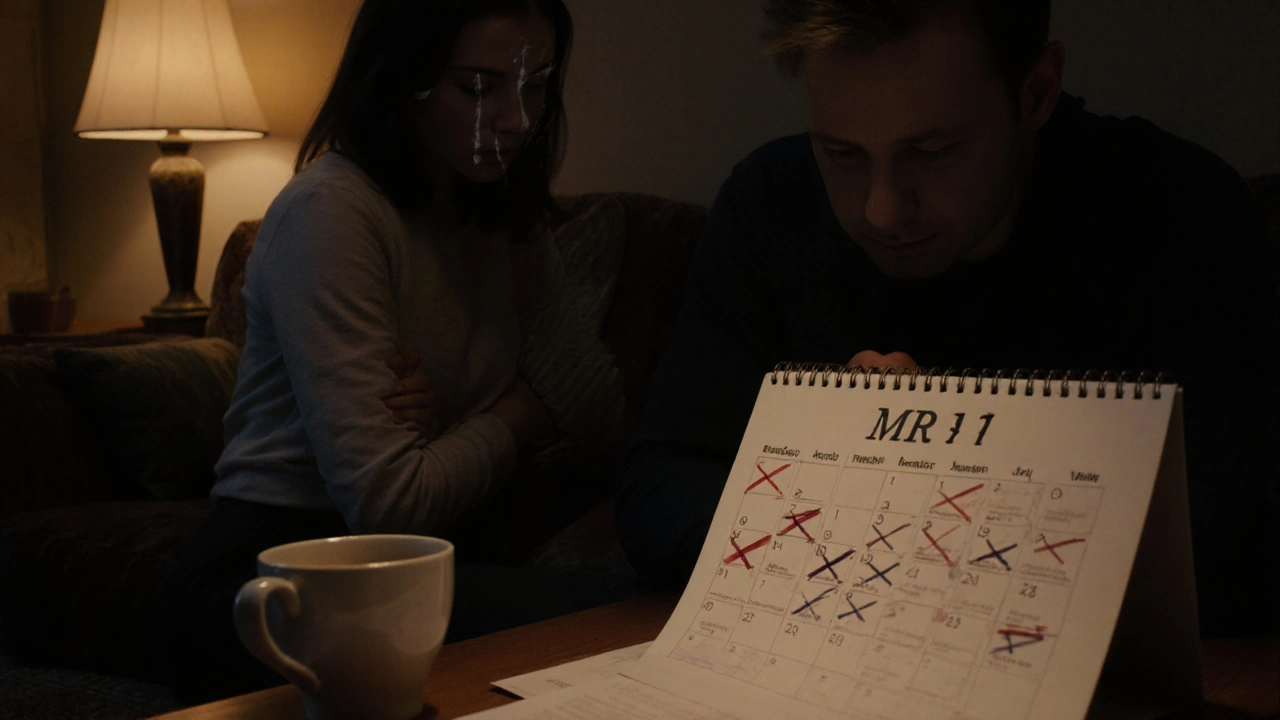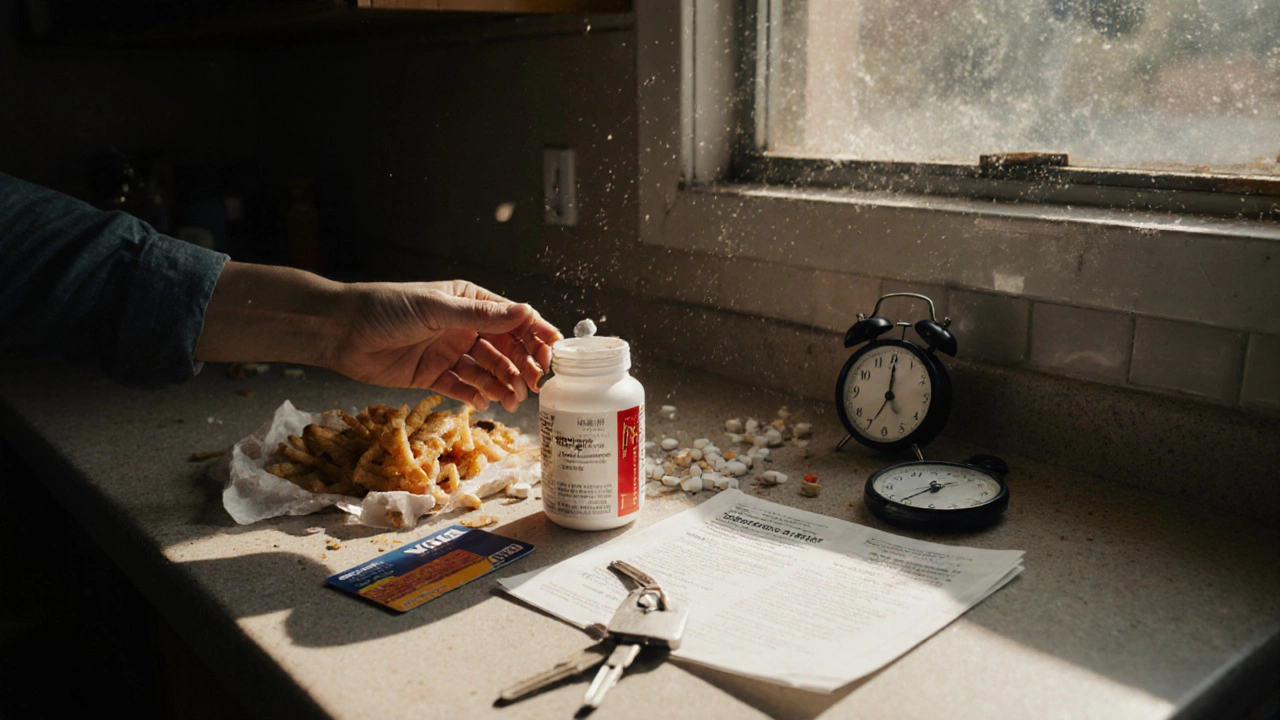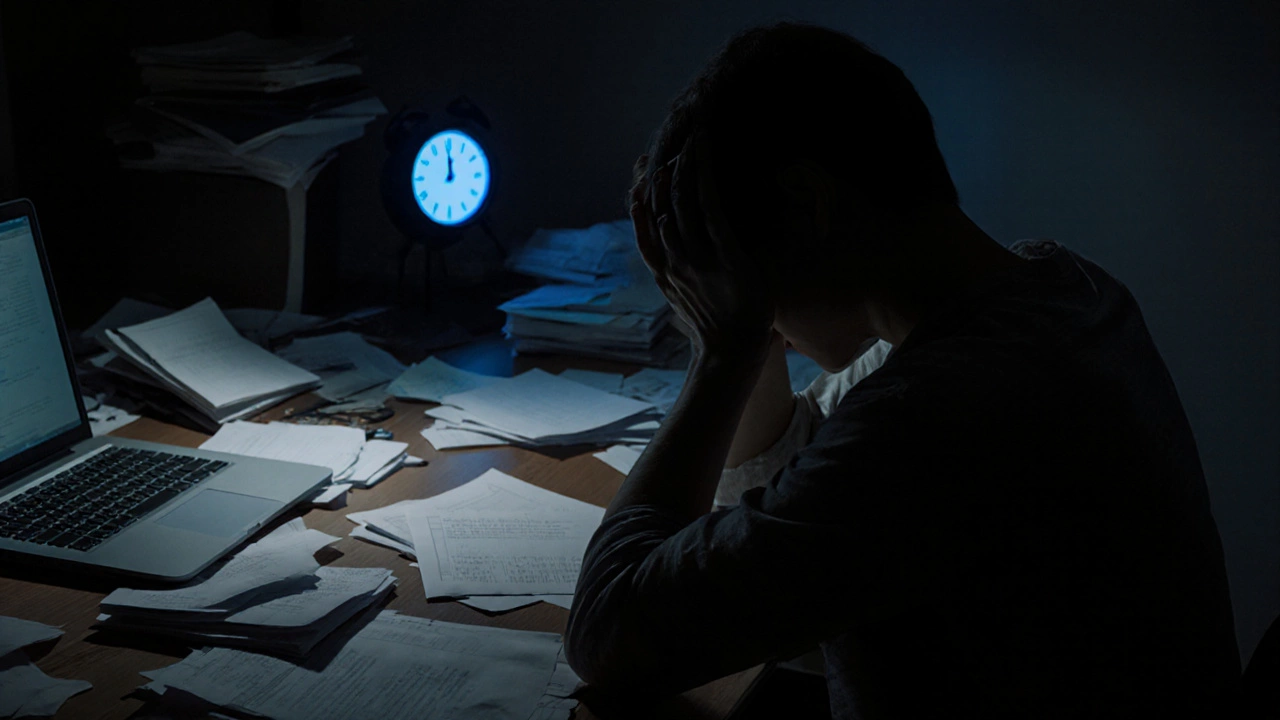Untreated ADHD isn’t just about forgetting keys or missing deadlines. Left unaddressed, it can quietly reshape your life-your relationships, your career, even your physical health. It’s not laziness. It’s not poor discipline. It’s a neurodevelopmental condition that, without proper support, sends ripple effects through every part of your daily existence.
Chronic Stress and Burnout
People with untreated ADHD often live in a state of constant low-grade panic. Tasks pile up. Deadlines slip. Apologies multiply. Over time, this creates a cycle of stress that doesn’t fade after the task is done. The brain doesn’t reset. Cortisol levels stay elevated. Studies show adults with untreated ADHD are twice as likely to report chronic stress compared to those without the condition. Many describe it as running on a treadmill that keeps speeding up-no matter how hard they try to keep pace.
Relationship Strain and Isolation
Forgetfulness isn’t just annoying-it’s corrosive. Missing anniversaries, forgetting promises, interrupting conversations, losing track of plans-these aren’t personality flaws. They’re symptoms. Partners, friends, and family start to feel unimportant. Trust erodes. One study from the University of California found that couples where one partner has untreated ADHD are 50% more likely to separate within five years. Social withdrawal follows. The person with ADHD starts avoiding gatherings, fearing judgment. Others stop inviting them. Loneliness becomes a default state.
Underachievement at Work and School
Many with untreated ADHD have high IQs but low job satisfaction. They’re brilliant in brainstorming sessions but struggle to finish reports. They start projects with energy but abandon them halfway. Employers notice inconsistency, not potential. In school, bright kids get labeled as "underachievers" or "lazy." By adulthood, they’re stuck in jobs below their capability-or unemployed. A 2024 analysis of U.S. labor data showed adults with untreated ADHD earn, on average, 30% less than their peers with similar education levels. The gap isn’t about skill. It’s about execution.
Increased Risk of Substance Abuse
Self-medication is common. Alcohol, cannabis, stimulants-people turn to these to quiet mental noise, calm restlessness, or finally feel "normal." The National Institute on Drug Abuse reports that adults with untreated ADHD are three times more likely to develop a substance use disorder. It’s not a moral failure. It’s a neurological coping mechanism. The brain craves dopamine, and substances deliver it fast. But the relief is temporary. The dependency isn’t.

Mental Health Comorbidities
Untreated ADHD rarely travels alone. Anxiety? Common. Depression? Very. Borderline personality traits? Often. The constant struggle to manage daily life wears down emotional resilience. One in two adults with untreated ADHD develops clinical depression before age 30. Anxiety disorders appear in nearly 70%. These aren’t side effects-they’re direct consequences. The brain, constantly under siege by disorganization and rejection, starts to believe it’s broken. That belief becomes a self-fulfilling prophecy.
Physical Health Decline
It’s not just mental. Untreated ADHD affects your body. Poor sleep patterns-delayed bedtimes, erratic routines-lead to chronic fatigue. Impulse control issues mean poor dietary choices, skipped doctor visits, and inconsistent exercise. A 2023 study in the Journal of Clinical Psychiatry found adults with untreated ADHD had a 40% higher risk of obesity and a 25% higher risk of hypertension by age 40. They’re also more likely to have accidents-car crashes, falls, burns-because attention lapses aren’t just about forgetting names. They’re about missing stop signs.
Financial Instability
Impulse buying. Missed bill payments. Unplanned expenses. Difficulty budgeting. These aren’t signs of irresponsibility. They’re executive function failures. People with untreated ADHD often carry high credit card balances, have multiple overdrafts, or struggle to save. A survey by the ADHD Foundation found that 62% of untreated adults had been contacted by debt collectors by age 35. Financial stress feeds back into anxiety, depression, and shame-making it even harder to get help.

Legal and Behavioral Risks
Impulsivity doesn’t just mean buying shoes you don’t need. It can mean lashing out in anger, driving recklessly, or engaging in risky behaviors without thinking through consequences. While most people with ADHD aren’t criminals, untreated cases show higher rates of traffic violations, minor thefts, and public disturbances. A longitudinal study in Sweden tracked over 10,000 adults diagnosed with ADHD in childhood. By age 40, those without treatment were 3.5 times more likely to have a criminal record than their peers.
Why Early Intervention Changes Everything
ADHD isn’t a life sentence. Treatment doesn’t mean pills. It means structure. Therapy. Coaching. Lifestyle adjustments. Medication helps some-but not all. Behavioral strategies like time-blocking, external reminders, and accountability partners work for many. The goal isn’t to "fix" you. It’s to give you tools to work with your brain, not against it. People who start treatment in their 20s or 30s often report their first real sense of control in years. Relationships improve. Jobs stabilize. Sleep returns. The weight lifts-not because they changed who they are, but because they finally understood how they work.
What to Do If You Recognize This in Yourself
You don’t need a perfect checklist to seek help. If you’ve felt this way for years-constantly behind, overwhelmed, misunderstood-it’s worth exploring. Start with a psychologist or psychiatrist who specializes in adult ADHD. Don’t wait for "it to get worse." The longer it goes untreated, the more damage accumulates. Support groups, apps like Todoist or Time Timer, and even simple daily routines can make a difference. You’re not broken. You’re wired differently. And that difference can be managed.
Can untreated ADHD cause permanent brain damage?
No, untreated ADHD doesn’t cause permanent structural damage to the brain. But long-term stress, poor sleep, and lack of stimulation can weaken neural pathways related to focus and emotional regulation. The brain adapts to chronic chaos, making it harder to develop healthy habits later. Early intervention helps restore those pathways.
Is ADHD only a childhood disorder?
No. While symptoms often appear in childhood, up to 60% of children with ADHD continue to experience significant symptoms into adulthood. Many adults go undiagnosed because they’ve learned to mask symptoms or were told they’d "grow out of it." Adult ADHD looks different-it’s less about hyperactivity and more about internal restlessness, disorganization, and emotional dysregulation.
Can lifestyle changes alone treat ADHD?
Lifestyle changes help-but rarely fix everything on their own. Regular exercise, good sleep, and structured routines improve symptoms significantly. But for most people, combining these with therapy or medication leads to the best results. Think of it like wearing glasses for nearsightedness: glasses don’t cure your eyes, but they let you see clearly. Same with ADHD tools.
Does ADHD get worse with age?
ADHD symptoms don’t necessarily worsen with age, but the consequences of untreated ADHD often do. As responsibilities grow-career demands, parenting, finances-the systems that once worked (like cramming before exams) fail. What was manageable in college becomes overwhelming in a full-time job. The gap between ability and performance widens, making it feel worse.
Is it too late to get help if I’m over 40?
Never. People in their 50s and 60s are being diagnosed for the first time-and reporting life-changing improvements. Treatment at any age reduces stress, improves relationships, and restores confidence. You don’t need to have had a diagnosis to benefit from support. Your brain can adapt at any stage.
